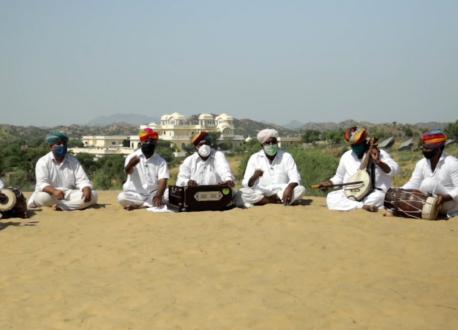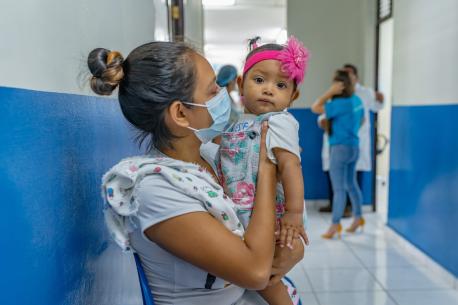
In India, Traditional Tunes Bind Communities Against COVID-19
Folk musicians in Rajasthan teamed up with UNICEF to help get the word out about COVID-19 vaccines and their important role in ending the pandemic. They performed at dozens of events that reached hundreds of thousands of people — helping to boost vaccination rates in just a few months.
Rajasthan, the Indian state known for its royal palaces and camel rides, has been an all-time favorite among international tourists for decades. From colorful puppet shows to the centuries-old tunes sung by locals, the world’s 20th largest desert region has everything needed to attract more than a million visitors every year.
All the more reason to keep the region safe and vaccinated from COVID-19.
To spread awareness about the safety and efficacy — and availability — of COVID-19 vaccines, boost vaccine confidence and encourage uptake in Rajasthan and beyond, UNICEF decided to take the cultural route — and communicate in song.
Jaisalmer, the largest district in Rajasthan, lies in the Thar Desert, which straddles the border with Pakistan. It is somewhat remote but very popular with tourists. As of January 2022, Jaisalmer had recorded over 13,000 COVID-19 cases.
In 2020, UNICEF reached out to local Manganiyar folk artists to collaborate on an awareness campaign that would use traditional music to convey key messages. Nearly 50 Manganiyars, chosen for their deep connections to the community — the clan goes back generations — were then trained by UNICEF communication specialists to take part.
The campaign to communicate key messages in song began in areas with the lowest vaccine coverage rates
Before launch, vaccination records were analyzed to identify areas in the district that had the lowest vaccine coverage, and focused on those areas first. Events were held in 16 village councils in October 2020 to start, quickly expanding from there. There have been 166 shows in 160 village councils in Rajasthan to date, reaching over 888,850 people.
The campaign — implemented by UNICEF with funding from USAID — has since been credited with helping to boost vaccination rates. Between August 2021 and December 2021 — about a year after the campaign's launch — the proportion of the region's population that had received their first COVID-19 vaccine dose had jumped from 50 percent to 90 percent.
“We told the people ... about the COVID vaccine through songs and encouraged them to vaccinate," said Dayam Khan, one of the trained folk artists. "Many of these people, including pregnant and lactating mothers, took the vaccine as a result.”
New lyrics to traditional songs were written in the local dialect to convey the importance of getting vaccinated
The lyrics of the songs, written in the local dialect, communicate that the virus is still around, and that "we need to win this battle with a vaccine." As Manjaree Pant, Communication for Development Specialist with UNICEF India, explains, the team made a concerted effort to ensure that the songs were inclusive in nature.
“Folk forms tend to glorify social norms which may not be pro-women and inadvertently send out messages which may not be rights-centric," Pant said. "While orienting the folk musicians, it was important to weed out not just gender-based biases but even community-based biases."

Few countries have been hit as hard as India by the COVID-19 pandemic. A deadly surge in cases in 2021 placed an enormous strain on health and critical care facilities across the country, leaving vulnerable families paying a particularly steep price.
UNICEF and partners have been supporting India's pandemic response by delivering critical supplies — face shields and surgical masks, oxygen concentrators, diagnostic tests and other emergency equipment. UNICEF delivered 8.5 million triple-layered masks and 1.75 million face shields to India in 2021.
UNICEF continues to support health workers in India as they strive to maintain critical services for children
The support from UNICEF to the country's health workers fighting COVID-19 in India — and all around the world — continues as part of UNICEF's global pandemic response. Together with partners, UNICEF continues to support communities and essential workers to weather this storm and prevent further disruption to other critical services for children.
Engaging youth continues to be a critical component of UNICEF and partners' efforts to dispel myths and address vaccine hesitancy. As Sid Shrestha, UNICEF India's Chief of Social and Behavior Change, writes in this recent op-ed, “Harnessing the energy of youth will be crucial for sustainable change in communities."
Learn more about UNICEF's work in India.
Support UNICEF's mission for vulnerable children and families around the world. Donate today.
HOW TO HELP
There are many ways to make a difference
War, famine, poverty, natural disasters — threats to the world's children keep coming. But UNICEF won't stop working to keep children healthy and safe.
UNICEF works in over 190 countries and territories — more places than any other children's organization. UNICEF has the world's largest humanitarian warehouse and, when disaster strikes, can get supplies almost anywhere within 72 hours. Constantly innovating, always advocating for a better world for children, UNICEF works to ensure that every child can grow up healthy, educated, protected and respected.
Would you like to help give all children the opportunity to reach their full potential? There are many ways to get involved.




